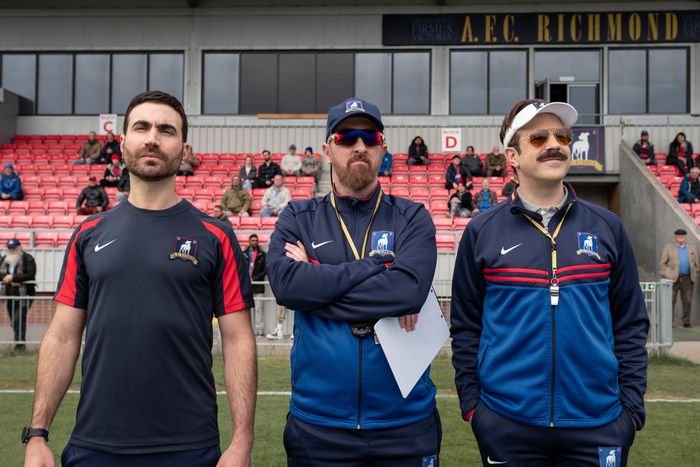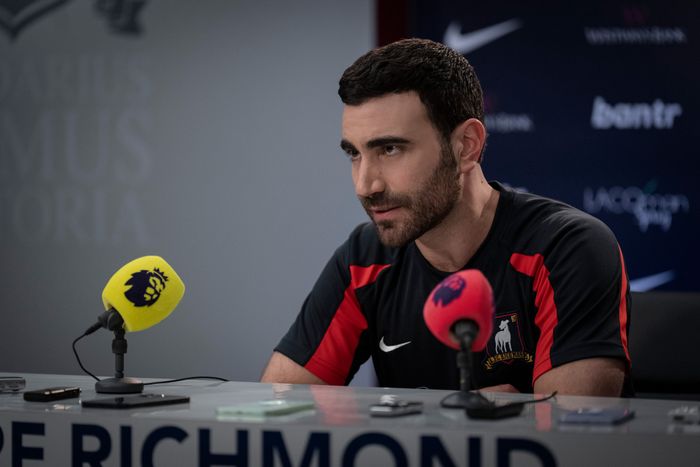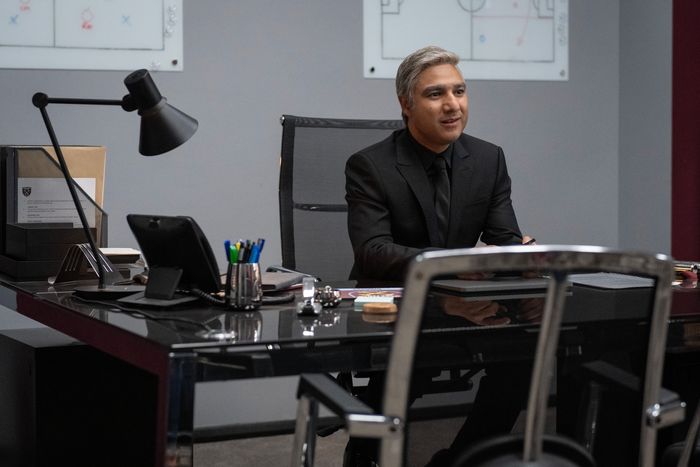
In its first season, Ted Lasso was about the importance of kindness and optimism, and balancing these qualities to live a more fulfilling life. Through its tale of an aw-shucks American traveling to the U.K. to coach a down-on-its-luck soccer team, and bonding the players together with his earnest, fish-out-of-water speeches, Ted Lasso exploded in popularity during a COVID era when many craved that niceness. Then, the series complicated that message with a second season that poked at toxic positivity, revealed chinks in its grinning titular character’s armor, and told men that it’s okay to go to therapy, actually! The seasons mostly worked together as a complementary pair, with Ted heralded for his ideology but also gently prodded toward self-growth. All together, it was a fairly heartwarming journey, if you could get past the fact that this character started as a joke in an NBC promo.
Given all that: Why does Ted Lasso season three feel so bumbling, so tedious, so discombobulated? Apple TV+ has refused to confirm whether this season will indeed be the series’ last, but there’s a last-gap quality to these episodes and a hastiness to the storytelling that makes the show’s internal world feel inexplicably small. New characters arrive to grab large chunks of the story, and then disappear; Ted puts less of his energy toward coaching than meandering toward the realization that he doesn’t really belong in the U.K. anymore; the Greyhounds’ locker room has taken on the sanctimonious atmosphere of an after-school special; episode lengths stretch past an hour!
All of those issues come to a head in this week’s “La Locker Room Aux Folles,” in which our favorite Ted Lasso characters each suffer in their own ways from this season’s disjointedness. In the Ted Lasso tradition, Vulture’s TV critics got together to talk through our issues with the show’s unfortunate embodiment of garbage time, broken down by characters whose arcs range from merely muddled to downright inexplicable.
Roy Kent
When Roy does have a story, he’s one of the stronger Ted Lasso characters. In this week’s episode, for instance, Roy and Rebecca have some fun exchanges about how he needs to get his act together and behave like he actually wants his job. The press conference scene at the end? Perfectly nice! But then you try to figure out why Rebecca is yelling at Roy, or why Roy needs any reminding about his purpose on this team, and it’s like staring into the void. Roy was sad about Keeley … and then the Amsterdam episode seemed to make him feel better? Roy was out of sorts, but also he’s been throwing himself into training Jamie, which has seemed to give him a lot to do? Even within this episode, Rebecca comes to yell at Roy that he needs to do his job, and when she comes to find him, he’s in the middle of doing (a different part of) his job. Is the arc that he’s sad about Keeley and needs to get over it? Do they need to get back together? Is it that he’s still looking for a purpose? What does he want that he doesn’t already have?! What is he now, other than a collection of grunts and the ability to say funny things without smiling? —Kathryn VanArendonk
Keeley Jones
Who even is this person? Where is the vivacious, confident, curious Keeley who got to know people, who believed in herself, who didn’t change who she was to please others? Very little about her arc this season works, from the PR company where she is surrounded by anonymous co-workers and seems to have no actual tasks, to her chemistry-less relationship with Jack and uncharacteristic disappointment when they break up (why would any version of Keeley go back to a partner who so belittled her?), to her friendship with Rebecca, which now resembles a teacher patting her favorite pupil on the head. If Keeley’s story line this season is a spinoff’s backdoor pilot, whew, man, shut it. —Roxana Hadadi
Rebecca Welton
Who is Rebecca without Rupert? Ted Lasso has asked this question from the beginning, exploring what kind of leader Rebecca is once she’s separated from the self-involved toxicity of her ex-husband. The answers have always been sparse (she likes Ted’s shortbread, she likes Keeley, she likes when the Greyhounds win), but at least they felt in line with a powerful woman relishing her independence. So why this turn into Rebecca taking a psychic’s predictions seriously? After the season-two romance between Rebecca and Sam, the character has felt like she’s floating, and this ping-ponging through moments that align with details from the psychic’s reading isn’t doing much to dispel that haphazardness. A push toward motherhood doesn’t feel redemptive; it feels like Ted Lasso running out of ways to imagine the inner life of a woman of a certain age. If this is all building to a scene where Rebecca realizes that the team is really like her child and they are one big family, we need Ask a Manager to weigh in on the downside of blurring personal and professional boundaries, ASAP. —R.H.
Nate Shelley
Season two ended with Nate crossing over to the dark side and becoming the coach of Richmond’s rival team, West Ham, a turn of events that set up what could have been an intriguing exploration of how easy it is for male insecurity to morph into mean-spiritedness. While the third season initially signals that we are now dealing with Bad Nate — he shows up at work to an Eric B. and Rakim song (intimidating!), yells at his colleagues (rude!), busts on Ted and his team at a press conference (spicy!), rips down the “Believe” sign in the Richmond locker room (what a dick!), and displays the killer instinct on the field that Rupert so admires — it backs away from really digging into that transformation faster than Dominic Toretto can drive a flaming car in reverse. By episode four, he’s almost apologizing to Ted in an elevator. By episode five, he’s more or less nice Nate again. And now, in episode nine, he’s clearly uncomfortable with Rupert’s attitude toward Jade, the woman who “saved” Nate by displaying all the personality of a blank whiteboard, and even rejects Rupert’s offer to make him one of his boys. What was the point of turning Nate into a nightmare if he was just going to revert back to being a mildly dysfunctional dream? This entire arc is emblematic of Ted Lasso at its most timid. —Jen Chaney
Nate’s Girlfriend
Sure, fine, she has a name. It’s Jade. Here are some other things we know about Jade: She is a hostess at Taste of Athens. She wears a necklace. She pees. She has read a book. She is very dedicated to spraying down menus. She likes breakfast. She has one time cracked one (1) joke about how her full name is Jaded and she was named after her aunt. Or was it not a joke? It’s hard to tell.
The list of things we don’t know about Jade is nearly infinite, but here are a few entries: why she originally did not like Nate, why she now does like Nate, any information at all about her interests, her desires, her hopes, her dreams, her hang-ups, her friends, her family (except for maybe that aunt!), what she is meant to signify about Nate’s future, or whether she’s intended to do anything at all beyond have meaning for Nate. Oh! But we do know she likes baklava. Never mind, someone go raise E.M. Forster from his grave; she’s a fully rounded character after all. —K.V.A.
The Greyhounds
Let’s check in with how the whole Greyhound pack is doing, nine episodes into the season:
Sam: lovely, sweet, seemingly has no purpose except to be lovely and sweet and remind everyone that immigration and friendship are good.
Colin: is gay, is now out to his teammates, was subjected to a speech about how they care about him enough to not let him eat so much seven-layer dip that he destroys a toilet.
Jamie: used to be an asshole, maybe isn’t now, taught Roy to ride a bike.
Zava: showed up, was an asshole, left abruptly, entire existence wiped off the face of the Earth.
Dani: says silly things!
Isaac: loves Colin, has something probably interesting happening in his life that’s none of our business. —K.V.A.
The Sport of Football
Ted Lasso has become a show about football that only sporadically shows football being played — which is odd because, you know, football is the thing! The thing that the Greyhounds do and the thing that brought Ted to the U.K.! Yet episodes zoom through matches, depriving us of the character development that would come through during gameplay — never more so than in this episode, when Colin, now out to the team, rallies them to victory as he lives his truth. We don’t see any of that, which means we don’t see how Colin’s revelation made him more confident, or how his teammates might now better recognize his leadership ability on the field, or how Sam dealt with the responsibility of stepping in as captain, or how Jamie reacted to being passed over. There’s friction to gameplay, and Ted Lasso, in its quest to remove anything even remotely resembling tension from its storytelling, is missing out on the euphoria of competition, too. —R.H.
Trent Crimm
Everyone across this wide world can agree that Trent Crimm has magnificent hair and, for that reason alone, deserves to be a continued presence on this series. But for God’s sake, if he’s going to be a real character, give him something to do. While Trent is shadowing the team for the sake of writing a book — an arrangement made in an absurdly speedy manner — the only window we’ve really gotten into that process is seeing him hover around the locker room or stand in doorways, notebook in hand. This guy was once an intimidating, take-no-prisoners journalist. Now he’s mostly a mild-mannered observer who willingly howls like a Diamond Dog. We do learn this season that Trent is gay, but that detail serves more to move Colin’s story forward than offer insight into who Trent is. If some additional conflict doesn’t arise because of Trent’s book project, and soon, I’m going to start seriously resenting that tremendous mane. Wow, Ted Lasso season three. You’ve actually almost turned me against Trent’s hair. —J.C.
Leslie Higgins
Our sweet Leslie might be one of the only characters having a good (and believable) time on this season of Ted Lasso, acting in the exact way that we would expect for this character and enjoying himself while doing it. He’s firmly one of the Diamond Dogs, he has Rebecca’s ear, and he gets to live out a lifelong dream by playing jazz onstage at a club in Amsterdam. He seems fine! Kitman Will Kitman (there’s that Ted Lasso humor for you) is also fine! That’s the power of Ryan Gosling’s beloved jazz! —R.H.
Coach Beard
It’s hard to criticize the lack of character development around a character who was designed to not be fully developed. The lack of information about Beard has always contributed to his mystique and set up surprising jokes and reveals. (See: Coach Beard showing up on the team bus dressed as Piggy Stardust.) But Beard has started to feel like more of a caricature than an actual person who might exist in the world. When Will the kitman dressed up as Beard, it almost felt like the show was telling on itself and admitting that Beard has basically become a baseball cap with facial hair that yells, “Ba-by!” on a regular basis. My Beard frustration hit its peak in the most recent episode when he started screaming at a room full of reporters about how Joe Walsh is a better guitarist than Jimmy Page. Not only is it unconvincing that Beard would get this irate during a press conference, I could not, for the life of me, figure out why this subject was being debated in the middle of a media event about professional football. The joke of the scene lies in how random that is, but in the context of a season three in which so much doesn’t make sense, it just comes across as more flailing. —J.C.
Ted Lasso
Ted being a kind but unprepared bumpkin was charming in season one, but he’s been the coach of AFC Richmond for multiple seasons. He should know some shit about soccer by now. Yet he’s still out here referring to friendlies as exhibition games and barely doing the work of coaching (that’s mainly left to Roy now). And how did he not know who international superstar Zava was? If an NBA coach said, out loud, “Wait, who is this LeBron guy?” they would be fired on the spot, and they would deserve it!
It was Ted himself who said, “Be curious, not judgmental,” but he doesn’t seem curious enough about the sport he coaches. He also is not curious enough to bother thinking how others might react to his words before he speaks. His speech this week suggesting that being an unsupported Denver Broncos fan is totally the same as being gay was so tone-deaf and asinine, I was almost tempted to make a bowl of seven-layer dip just so I could throw it at my TV. A character that started out as a testament to how unbridled optimism can raise up an entire organization has become another example of a white man who could do the world a favor by shutting up 75 percent of the time he thinks he should say something. —J.C.
Ted Lasso
No character arc is more troubling and uncertain than that of Ted Lasso, the show. It was an underdog that became a beloved cultural icon, inspiring rabid fandom and hifalutin statements about how it alone understood what people wanted in this moment. It’s not surprising that the show would falter a bit from that early high. It was a “this moment” kind of show, and one thing about moments is that they never last. But there’s a gargantuan gulf between where this show began and where its possibly (probably?) final season is heading. Ted Lasso was a guy with great jokes and great stories, and when he could tickle your heartstrings you were just so happy to have him around. Now it’s like he’s over there in a corner yelling about the Denver Broncos and the plight of divorced celebrity dads and how hard it is when you’re a celebrity and your phone gets hacked, and we’re all trying to politely look away. Perhaps some other show could come over and give Ted Lasso an inspirational speech about getting its act together? —K.V.A.








